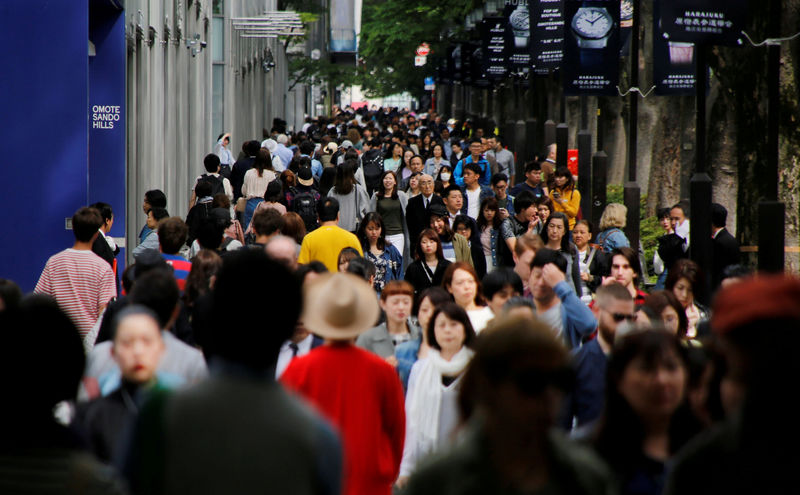Investing.com’s stocks of the week
By Tetsushi Kajimoto
TOKYO (Reuters) - Japan's economic growth was much weaker in the first quarter than initially estimated, the Cabinet Office said, but analysts made light of the decline as a "one-off" adjustment in oil inventories that would not thwart recovery.
Japan's economy, the world's third largest, expanded at an annualized rate of 1.0 percent in the first quarter, less than half the initial estimate of 2.2 percent growth and 2.4 percent gain seen by economists, Cabinet Office data showed on Thursday.
The data follows a recent run of indicators that suggests continued economic growth in the current quarter due to solid exports and factory output, although wage growth and household spending remain lackluster, despite a tight job market.
The Bank of Japan is now expected to stand pat at its next rate review on June 15-16, although a majority of the economists in a Reuters poll last month forecast the BOJ's next move would be to pull back its stimulus.
The GDP data was revised as primary oil distributors squeezed their crude oil inventory because some refineries were offline for repairs, bringing crude oil inventory levels at the end of March to the lowest since 2000, Cabinet Office officials said.
"The data is not as bad as the headline figure appears. It supports the BOJ's upbeat view on the economy," said Takeshi Minami, chief economist at Norinchukin Research Institute.
"Excluding the revision to inventory, private final demand including capital expenditure was strengthening, suggesting that export-led recovery is broadening gradually. It's true private consumption is weak, but it will likely firm up from now on."
On the quarter, the Japanese economy grew a revised 0.3 percent in real, price-adjusted terms, against a preliminary reading of a 0.5 percent increase and the median estimate of a 0.6 percent expansion.
Capital expenditure, a key component of GDP, rose 0.6 percent for the quarter, outstripping the preliminary estimate of a 0.2 percent increase.
Inventories shaved 0.1 percentage point off growth, revised down from a 0.1 percent point contribution originally posted.
Private consumption, which accounts for roughly 60 percent of GDP, rose 0.3 percent, down from the preliminary 0.4 percent gain. Tame wages and consumer spending have kept Japan from beating deflation, posing a key challenge for the BOJ in meeting its 2 percent inflation goal via a massive bond-buying program.
Taken together, government, business and household demand contributed 0.1 percentage point to growth, versus the initial 0.4 percentage point recorded. Net exports added 0.1 point to growth, unchanged from the preliminary estimate.
